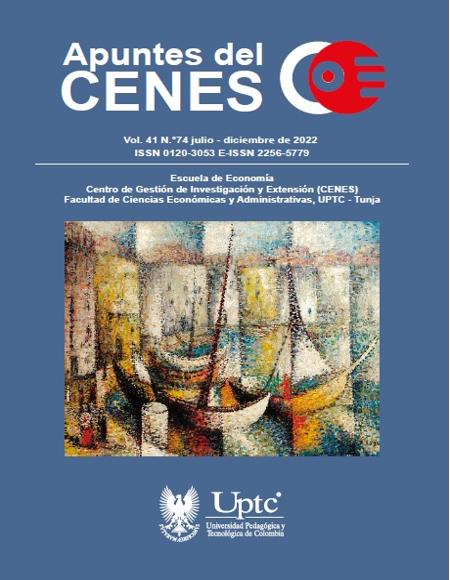Behavioral Economics: An Analysis from Interdisciplinarity and Complexity

Abstract
The article analyzes several assumptions of behavioral economics, to contribute to its application and theoretical understanding. The research is pure basic, documentary and exploratory. The main theoretical references of behavioral economics are analyzed through the hypothetical-deductive method. A logical-epistemic-prospective study of the knowledge built in behavioral economics and possible further advances is carried out. The research points out the need to complement the limited rationality perspective, analyzes the dual system of reasoning (SDR) and focuses on experimentation as a way to generate new knowledge. The conclusions promote the understanding of rationality from an interdisciplinary and complex vision, with components such as cognitive potential, optimization of results, sufficient information, and control. The SDR is considered to be complex, where reflexive and self-control elements make the response speed slower. These considerations generate new opportunities for analysis and reflection on the psychosocial determinants of the behavior of economic agents.
Keywords
economics, rationality, beliefs, decision making, experimentation, economic behavior
Author Biography
Aimara Rodríguez Fernández
Ph. D. en el Programa de Aportaciones Educativas en las Ciencias Sociales y Humanas. Rectora de la Universidad Laica Vicente Rocafuerte de Guayaquil, Ecuador.
References
- Barra, R. (2020). La teoría de la utilidad esperada: descubriendo su realismo y veracidad en el entorno empresarial peruano Tesis de Doctorado en Gobierno de Organizaciones. Universidad de Piura, PAD-Escuela de Dirección, Lima, Perú. https://hdl.handle.net/11042/4740
- Bonome, M. G. (2009). La racionalidad en la toma de decisiones: análisis de la teoría de la decisión de Herbert A. Simon. Netbiblo.
- Botero, M. P., & Zarama, S. (2010). La economía conductual: tendencia actual en el análisis económico del derecho. Universitas Estudiantes, (7), 215-234. https://bit.ly/3AAHOSR
- Brañas-Garza, P. & Paz, M. (2011). Economía experimental y del comportamiento. Papeles del Psicólogo, 32 (2), 185-193. https://www.redalyc.org/pdf/778/77818544008.pdf
- Camerer, C., Lowenstein, G., & Rabin, M. (2004). Advances in Behavioral Economics. Princeton University Press. DOI: https://doi.org/10.1515/9781400829118
- Cifuentes Gómez, C., Delgado Ruiz, S. T., & González, J. I. (2021). El comportamiento económico desde la perspectiva biológica y psicológica. Apuntes del Cenes, 40(72), 17–43. https://doi.org/10.19053/01203053.v40.n72.2021.12474 DOI: https://doi.org/10.19053/01203053.v40.n72.2021.12474
- Clark, J.M. (1918). Economics and Modern Psychology. Journal of Political Economy, 26(1), 1-30. https://www.jstor.org/stable/pdf/1820785.pdf DOI: https://doi.org/10.1086/253060
- De Benito, L. (2018). Una propuesta behavioral para estructurar productos de ahorro a largo plazo en España. Facultad de Derecho. Repositorio Universidad de Comillas. https://bit.ly/3uQCFHb
- Frank, R. (2005). Microeconomía y conducta (5.a ed.). McGraw Hill.
- Friedman, M. (1953). Essays in Positive Economics. University of Chicago Press.
- Gigerenzer, G. (2015). On the Supposed Evidence for Libertarian Paternalism. Review of Philosophy and Psychology, 6, 363-383. https://doi.org/10.1007/s13164-015-0248-1 DOI: https://doi.org/10.1007/s13164-015-0248-1
- Gigerenzer, G. (2020). ¿Cómo explicar el comportamiento? Topic in Cognitive Science, 12(4), 1363-1381. https://doi.org/10.1111/tops.12480 DOI: https://doi.org/10.1111/tops.12480
- Hall, C.C. & Hernández, M. (2021, 21 de junio). Breaking the Silence: Can Behavioral Science Confront Structural Racism? Behavioralscientist.org https://behavioralscientist.org/breaking-the-silence-can-behavioral-science-confront-structural-racism/
- Hernández, R., Fernández, C. & Baptista, M.P. (2014). Metodología de la investigación (6.a ed.). McGrawHill Education. https://bit.ly/39NYjjt
- Ivarola, L. (2014). Realismo de los supuestos en economía: un análisis bajo la lógica de los procesos socioeconómicos. HYBRIS, Revista de Filosofía, 5(2), 7-26. https://zenodo.org/record/12908#.Yg0bD-jMLIU
- Kahneman, D. (2017). Pensar rápido, pensar despacio. Debolsillo.
- Krugman, P. (2009). ¿Cómo pudieron equivocarse tanto los economistas? Apuntes del Cenes, 28(47), 185-194. https://revistas.uptc.edu.co/index.php/cenes/article/view/87
- Loewenstein, G., Asch, D.A., Friedman, J.Y., Melichar, L.A., & Volpp, K.G. (2012). Can Behavioural Economics Make Us Healthier? British Medical Journal, 344, e3482. 10.1136/bmj.e3482 DOI: https://doi.org/10.1136/bmj.e3482
- Machlup, F., (1955). The Problem of Verification in Economics. The Southern Economic Journal, 22(1), 1-21. https://doi.org/10.2307/1054005 DOI: https://doi.org/10.2307/1054005
- Mani, A., Mullainathan, S., Shaler, E., & Zhao, J. (2013). Poverty Impedes Cognitive Function. Science, 341(6149), 976-980. https://bit.ly/3FFfHpz DOI: https://doi.org/10.1126/science.1238041
- Marlow, M.L. & Abdukadirov, S. (2012). Can Behavioural Economics Combat Obesity? Regulation, Summer 2012, 14-18. https://bit.ly/3mQl0tt
- Martínez-Echevarría, M.A. (2005). Una antropología para el agente económico. En R. Rubio et al. (Eds.), Estudios de teoría económica y antropología (pp. 513-533). Unión Editorial. https://bit.ly/3iptbfe
- Márquez, G. (2004). Dos cuestiones insuficientemente debatidas acerca de los supuestos en economía. Análisis Filosófico, 24(1), 59-81. http://www.scielo.org.ar/pdf/anafil/v24n1/v24n1a03.pdf
- Miller, L. (2021). Economía del comportamiento, políticas conductuales y nudges. Gestión y Análisis de Políticas Públicas, 25, 46-57. https://doi.org/10.24965/gapp.i25.10866 DOI: https://doi.org/10.24965/gapp.i25.10866
- Muntané-Relat, J. (2010). Introducción a la investigación básica. RAPD Online, 33(3), 221-227. https://www.sapd.es/revista/2010/33/3
- North, D. (2007). Para entender el proceso de cambio económico. Norma.
- Ocón, A.L. (2019). Educación, conocimiento y poder: debates lógicos-epistémicos y enfoques alternativos respecto de la naturaleza humana. Revista Anacronismo e Irrupción, 9(16), 113-147. https://bit.ly/3AyGU9n
- Pérez, M. (2021) ¿Qué nos importa Skinner, treinta años después? Papeles del Psicólogo, 42(1), 10-25. https://doi.org/10.23923/pap.psicol2020.2940 DOI: https://doi.org/10.23923/pap.psicol2020.2940
- San Martín, R., Isla, P. & Melis, C. (2012). Preferencia temporal en el cerebro: una revisión crítica de las contribuciones de la neuroeconomía al estudio de la elección intertemporal. El Trimestre Económico, 79[2](314), 449-473. https://bit.ly/3oVIfoN DOI: https://doi.org/10.20430/ete.v79i314.65
- Simon, H. (1955). A Behavioral Model of Rational Choice. The Quarterly Journal of Economics, 69(1), 99-118. https://doi.org/10.2307/1884852 DOI: https://doi.org/10.2307/1884852
- Sunstein, C. R., & Thaler, R. H. (2006). El paternalismo libertario no es un oximorón. Derecho & Sociedad, (27), 159-182. https://bit.ly/3BEOqky
- Sunstein, C. & Thaler, R. (2017). Un pequeño empujón. El impulso que necesitas para tomar mejores decisiones sobre salud, dinero y felicidad. Penguin Random House Grupo Editorial.
